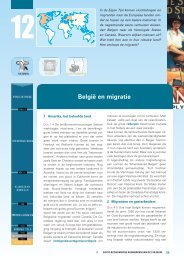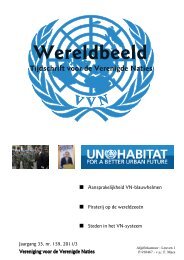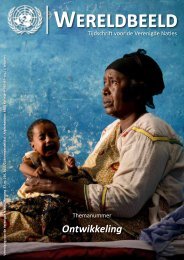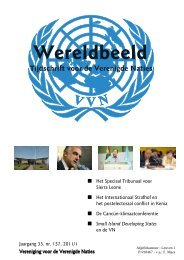Annex 5: United Nations Security Council Resolution 1874 (2009)
Annex 5: United Nations Security Council Resolution 1874 (2009)
Annex 5: United Nations Security Council Resolution 1874 (2009)
Create successful ePaper yourself
Turn your PDF publications into a flip-book with our unique Google optimized e-Paper software.
Beware of the Dynamics in the Decision-making Arena!<br />
The UN <strong>Security</strong> <strong>Council</strong> consists of five permanent members (the so-called “P-5”, with veto<br />
powers); the People’s Republic of China, the Republic of France, the Russian Federation, the<br />
<strong>United</strong> Kingdom and the <strong>United</strong> States. Furthermore, the UNSC consists of an additional ten<br />
non-permanent members; currently Austria, Burkina Faso, Costa Rica, Croatia, Japan,<br />
Socialist People’s Libyan Arab Jamahiriya, Mexico, Turkey, Uganda and the Socialist<br />
Republic of Viet Nam. In addition, a number of delegations will also be invited to the work of<br />
the <strong>Security</strong> <strong>Council</strong> during the negotiations, a representative of the following countries:<br />
- the Democratic People’s Republic<br />
of Korea, or DPRK (also ‘North<br />
Korea’),<br />
- the Republic of Korea, or ROK<br />
(also ‘South Korea’),<br />
- Australia,<br />
- Canada,<br />
- India,<br />
- Indonesia,<br />
- the Islamic Republic of Iran,<br />
- the Philippines,<br />
- the International Atomic Energy<br />
Agency (IAEA).<br />
Be aware that these invited delegations can be a source of advice and/or exert informal<br />
pressures on the negotiations. However, they do not have any voting powers in the UNSC…<br />
At the end of the day, it will thus be upon the 15 to (try to) decide upon an international<br />
course of action to safeguard peace and stability. The presidency of the <strong>Security</strong> <strong>Council</strong> will<br />
be observed by a number of professors, together with 2 vice-presidents (assistants).<br />
The distribution of the delegations among the different Flemish universities is as follows:<br />
Universiteit Antwerpen<br />
<strong>United</strong> States of<br />
America<br />
Uganda<br />
<strong>United</strong> Kingdom France Russian Federation<br />
Socialist People’s<br />
Libyan Arab<br />
Jamahiriya<br />
Socialist Republic of<br />
Viet Nam<br />
Croatia<br />
Mexico Japan Turkey Austria<br />
Philippines Republic of Korea Burkina Faso DPRK<br />
Islamic Republic of<br />
Iran<br />
International Atomic<br />
Energy Agency<br />
(IAEA)<br />
China Indonesia<br />
India Australia Costa Rica Canada<br />
© <strong>2009</strong> – Dr. D. Criekemans – Negotiations in UNSC on the continuing security provocations by North Korea 27







